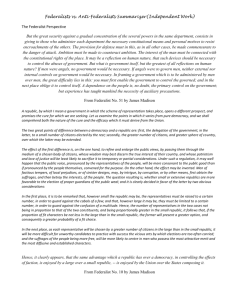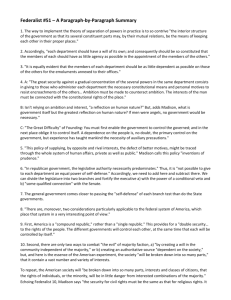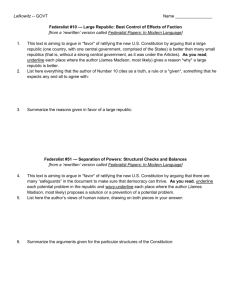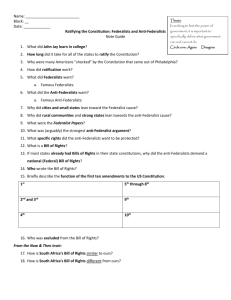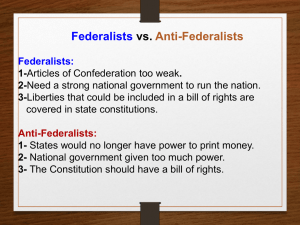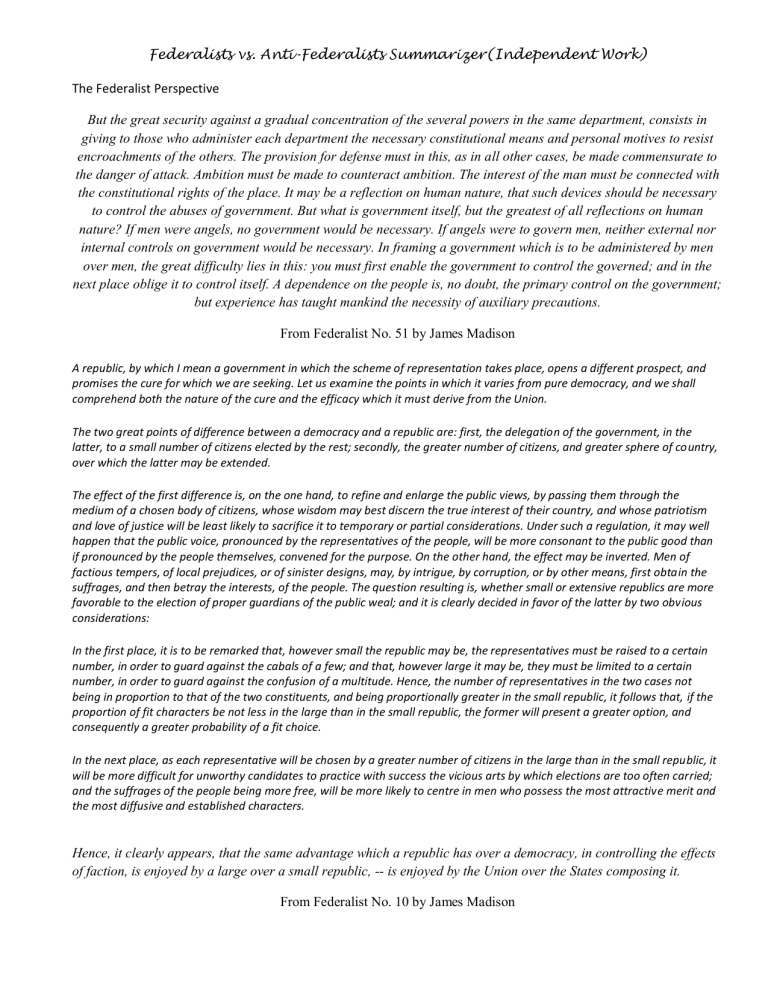
Federalists vs. Anti-Federalists Summarizer(Independent Work) The Federalist Perspective But the great security against a gradual concentration of the several powers in the same department, consists in giving to those who administer each department the necessary constitutional means and personal motives to resist encroachments of the others. The provision for defense must in this, as in all other cases, be made commensurate to the danger of attack. Ambition must be made to counteract ambition. The interest of the man must be connected with the constitutional rights of the place. It may be a reflection on human nature, that such devices should be necessary to control the abuses of government. But what is government itself, but the greatest of all reflections on human nature? If men were angels, no government would be necessary. If angels were to govern men, neither external nor internal controls on government would be necessary. In framing a government which is to be administered by men over men, the great difficulty lies in this: you must first enable the government to control the governed; and in the next place oblige it to control itself. A dependence on the people is, no doubt, the primary control on the government; but experience has taught mankind the necessity of auxiliary precautions. From Federalist No. 51 by James Madison A republic, by which I mean a government in which the scheme of representation takes place, opens a different prospect, and promises the cure for which we are seeking. Let us examine the points in which it varies from pure democracy, and we shall comprehend both the nature of the cure and the efficacy which it must derive from the Union. The two great points of difference between a democracy and a republic are: first, the delegation of the government, in the latter, to a small number of citizens elected by the rest; secondly, the greater number of citizens, and greater sphere of country, over which the latter may be extended. The effect of the first difference is, on the one hand, to refine and enlarge the public views, by passing them through the medium of a chosen body of citizens, whose wisdom may best discern the true interest of their country, and whose patriotism and love of justice will be least likely to sacrifice it to temporary or partial considerations. Under such a regulation, it may well happen that the public voice, pronounced by the representatives of the people, will be more consonant to the public good than if pronounced by the people themselves, convened for the purpose. On the other hand, the effect may be inverted. Men of factious tempers, of local prejudices, or of sinister designs, may, by intrigue, by corruption, or by other means, first obtain the suffrages, and then betray the interests, of the people. The question resulting is, whether small or extensive republics are more favorable to the election of proper guardians of the public weal; and it is clearly decided in favor of the latter by two obvious considerations: In the first place, it is to be remarked that, however small the republic may be, the representatives must be raised to a certain number, in order to guard against the cabals of a few; and that, however large it may be, they must be limited to a certain number, in order to guard against the confusion of a multitude. Hence, the number of representatives in the two cases not being in proportion to that of the two constituents, and being proportionally greater in the small republic, it follows that, if the proportion of fit characters be not less in the large than in the small republic, the former will present a greater option, and consequently a greater probability of a fit choice. In the next place, as each representative will be chosen by a greater number of citizens in the large than in the small republic, it will be more difficult for unworthy candidates to practice with success the vicious arts by which elections are too often carried; and the suffrages of the people being more free, will be more likely to centre in men who possess the most attractive merit and the most diffusive and established characters. Hence, it clearly appears, that the same advantage which a republic has over a democracy, in controlling the effects of faction, is enjoyed by a large over a small republic, -- is enjoyed by the Union over the States composing it. From Federalist No. 10 by James Madison Federalists vs. Anti-Federalists (Independent Work) The Anti-Federalist Perspective And here I would make this inquiry of those worthy characters who composed a part of the late federal Convention. I am sure they were fully impressed with the necessity of forming a great consolidated government, instead of a confederation. That this is a consolidated government is demonstrably clear; and the danger of such a government is, to my mind, very striking. I have the highest veneration for those gentleman; but, sir, give me leave to demand. What right had they to say, We, the people? My political curiosity, exclusive of my anxious solicitude for the public welfare, leads me to ask, Who authorized them to speak the language of We, the people instead of We, the states? States are the characteristics and soul of a confederation … The federal Convention ought to have amended the old system; for this purpose they were solely delegated; the object of their mission extended to no other consideration. You must, therefore, forgive the solicitation of one unworthy member to know what danger could have arisen under the present Confederation, and what are the causes of this proposal to change our government … This Constitution is said to have beautiful features; but when I come to examine these features, sir, they appear to me horribly frightful. Among other deformities, it has an awful squinting; it squints toward monarchy; and does not this raise indignation in the breast of every true American? Your President may easily become king. Your Senate is so imperfectly constructed that your dearest rights may be sacrificed by what may be a small minority; and a very small minority may continue forever unchangeably this government, although horribly defective. Where are your checks in this government? Your strongholds will be in the hands of your enemies. It is on a supposition that your American governors shall be honest, that all the good qualities of this government are founded; but its defective and imperfect construction puts it in their power to perpetuate the worse of mischiefs, should they be bad men; and, sir, would not all the world, from the eastern to western hemisphere, blame our distracted folly in resting our rights upon the contingency of our rulers being good and bad? Show me that age and country where the rights and liberties of the people were placed on the sole chance of their rulers being good men, without a consequent loss of liberty! I say that the loss of the dearest privilege has ever followed, with absolute certainty, every such mad attempt. If your American chief be a man of ambition and abilities, how easy it is for him to render himself absolute! The army is in his hands, and if he be a man of address, it will be attached to him, and it will be the subject of long meditation with him to seize the first auspicious moment to accomplish his design; and sir, will the American spirit solely relieve you when this happens? I would rather infinitely – and I am sure most of this Convention are of the same opinion – have a king, lord, and commons, than a government so replete with such insupportable evils. (Excerpts from Patrick Henry’s speeches at the Virginia ratification convention after the Constitutional Convention) Federalists vs. Anti-Federalists (Independent Work) Critical Thinking Questions/Patrick Henry: 1. Why is Patrick Henry concerned about the words “We, the people” in the Constitution? 2. Why does Henry think a system of checks and balances are important? What does he think is wrong with the assumptions of the authors of the Constitution concerning checks and balances? 3. What bothers Henry about the role of the President in the new Constitution? Critical Thinking Questions/Madison: From Federalist No. 10 4. According to Madison, why is a republic preferable to a democracy? 5. Why is a large republic more effective than a small republic? From Federalist No. 51 6. What does Madison mean by “ambition must be made to counteract ambition” ? 7. Madison says, “If men were angels, no government would be necessary. If angels were to govern men, neither external nor internal controls on government would be necessary. In framing a government which is to be administered by men over men, the great difficulty lies in this: you must first enable the government to control the governed; and in the next place oblige it to control itself. A dependence on the people is, no doubt, the primary control on the government; but experience has taught mankind the necessity of auxiliary precautions” What precautions did the Framers put in place in the Constitution to force the government to control itself? 8. In the chart below, compare and contrast the Federalist and the Anti-Federalists (think about everything we have learned during our Federalists vs. Anti-Federalists lesson). Federalists Both Anti-Federalists
